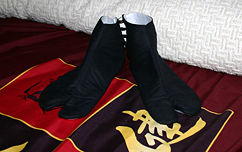- Jjokbari
-
Jjokbari ![A banner in South Korea reads: "Dokdo! Don't worry, the ghost and jjokbari-catching Marines are here."[1]](/pictures/enwiki/50/230px-Anti-japan_banner%2C_2005.jpg)
A banner in South Korea reads: "Dokdo! Don't worry, the ghost and jjokbari-catching Marines are here."[1]Korean name Hangul 쪽발이 or 쪽바리 Revised Romanization Jjokbari McCune-Reischauer Tchokpari Japanese name Kana チョッパリ Rōmaji Choppari Jjokbari (Korean: 쪽발이) is an ethnic slur in the Korean language used to refer to Japanese people. According to one survey, it was Korea's second-most common slur against Japanese people (ahead of waenom and behind ilbonnom, both meaning roughly "Japanese bastard(s)").[2]
Contents
Origin
The National Institute of the Korean Language notes that it is grammatically a noun, and defines it as:
- Walking with only one foot[3]
- Foot split into two, two-hooved foot[4]
- A word which conveys a disparaging view of Japanese people[5]
Jjokbari is generally accepted as literally meaning "pig's foot".[6] This is suggested to evoke a comparison between the appearance of a pig's cloven hooves and the feet of a person wearing tabi (traditional Japanese-style socks which have a separation between the big toe and its neighbor, to allow the wearing of thonged footwear). Alternatively, it may refer to the resemblance between the sound made by a pigs' hooves and that made by a person wearing geta (traditional Japanese wooden sandals) when they are walking.[7] However, a third theory states that jjok instead means "piece", with the intended implication being that Japanese shoes are incomplete compared to Korean shoes. Unlike Korean-style straw shoes which completely cover the foot, Japanese-style straw shoes consisted only of a sole and straps to bind it to the foot, leaving the top part of the foot exposed.[8]
In Japan
The term has also been borrowed into Japanese language spoken by ethnic Koreans in Japan, where it is rendered Choppari.[7] Its usage by Koreans in Japan is roughly comparable in social context to that of honky in the United States.[9] The form ban-jjokbari (literally, "half pig-foot") originated as a derogatory reference to Japanised Koreans during the Japanese colonial period in Korea; later, it came to be used by people in Korea to refer to ethnic Koreans in Japan.[10] The Japanised pronunciation of this form, ban-choppari, is also widely used by Koreans in Japan, either to refer to Japanised Koreans or to people of mixed Japanese and Korean descent.[7][11]
See also
References
Notes
- ^ Original: 독도야! 걱정마라, 귀신도 잡고, 쪽바리 잡는 해병대가 있단다
- ^ Miyazaki 2001: 23
- ^ Original: 한 발만 달린 물건
- ^ Original: 발통이 두 조각으로 된 물건
- ^ Original: 일본 사람을 낮잡아 이르는 말
- ^ Compare with the term for "ham hock", 족발/jokbal
- ^ a b c Constantine 1992
- ^ Lee 1999
- ^ International Herald Tribune 2001-03-24
- ^ Kramer 2003: 162-163
- ^ Gohl 1976: 139-141
Sources
- Constantine, Peter (1992). Japanese Street Slang. Boston, Massachusetts, United States: Weatherhill. ISBN 0834802503.
- Gohl, Gerhard (1976). Die koreanische Minderheit in Japan als Fall einer"politisch-ethnischen" Minderheitengruppe (The Korean minority in Japan as a case of a "political-ethnic" minority group). Wiesbaden, Germany: Harrassowitz.
- Kramer, Eric Mark (2003). The Emerging Monoculture: Assimilation and the Model Minority. Westport, Connecticut, United States: Praeger/Greenwood. ISBN 0275973123.
- Lee, O-Young (1999). Things Korean. North Clarendon, Vermont, United States: Tuttle Publishing. ISBN 0804821291.
- Miyazaki, Mina (2001). チョッパリからイルボンヘ 文化交流の効果 (From Choppari to Ilbon: the effects of cultural exchange). Seikei University. http://www.law.keio.ac.jp/~masuyama/semi/senri01.pdf. Retrieved 2007-05-10.
- Shoji, Kaori (2001-03-24). "From Tokyo, a Film of Us vs. Them". International Herald Tribune. Archived from the original on 2007-06-28. http://web.archive.org/web/20070628214907/http://www.iht.com/articles/2001/03/24/korfilm_ed2_.php. Retrieved 2007-05-10.
- "표준국어대사전 (Great Dictionary of the Standard National Language)". National Institute of the Korean Language. http://korean.go.kr. Retrieved 2007-05-10.
Ethnic and religious slurs White people GeneralAmericansLimey • Mick • Paddy • Pommy • Taffy (Welsh people) • Taig (Irish Catholics) • Teuchter (Scottish Highlanders)ItaliansJewsChrist killer • Kike • JAP • ŻydokomunaOtherBlack people GeneralAsians ABC • Ah Beng • Chinaman • Ching chong • Chink/chinky • Coolie • Gook • Jap • Jjokbari • Jook-sing • Sangokujin • ShinaArabsQadiani (Ahmadis) • Rafida (Shi'ites)Other Ajam (non-Arabs) • Batiniyya • Cholo (Mestizos) • Coonass (Cajuns) • Extracomunitario • Gâvur (non-Muslims) • Gentile (non-Jews) • Goy (non-Jews) • Infidel (non-Muslims) • Kafir (non-Muslims) • Kanaka (Pacific Islanders) • Kanake • Redskin (Native Americans) • Shegetz (non-Jewish boy or man) • Shiksa (non-Jewish women) • Squaw (Native American women)Categories:- Ethnic and religious slurs
- Korean words and phrases
- Anti-Japanese sentiment in Korea
- Zainichi Korean people
Wikimedia Foundation. 2010.

